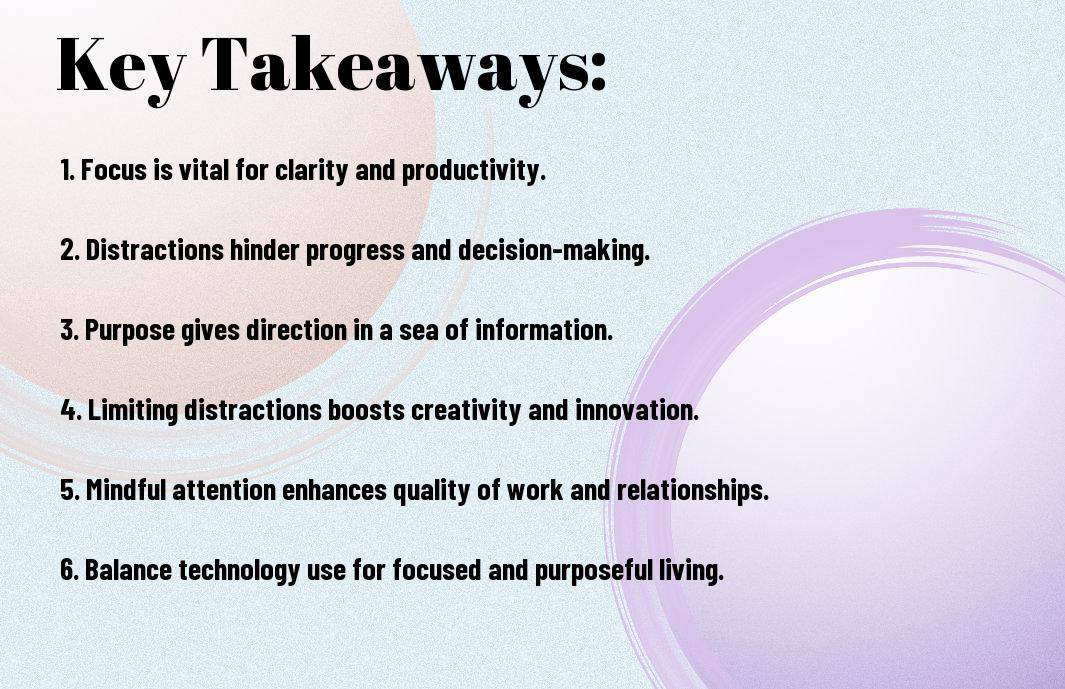
Newsletter Subscribe
Enter your email address below and subscribe to our newsletter

Enter your email address below and subscribe to our newsletter

Focus vs. Distraction – Finding Purpose in the Age of Information Overload! Many of us live in a world filled with endless streams of information vying for our attention. With the rise of smartphones, social media, and the internet, it has become increasingly challenging to maintain focus in our daily lives. This constant barrage of distractions can pull us away from our goals and prevent us from finding our true purpose.

Little do we realize how easily we can be drawn into the world of distraction. In today’s fast-paced environment, distractions are all around us, tempting us with their shiny allure. Whether it’s the ping of a new message on our phones, the constant stream of social media updates, or the never-ending supply of entertaining videos, distractions have a way of pulling us away from our intended tasks.
Science has shown that our brains are wired to seek out novelty and instant gratification. When we are faced with distractions, our brains release dopamine, the feel-good neurotransmitter that reinforces the behavior of seeking out more distractions. This cycle can become addictive, leading us to constantly seek out new stimuli and making it difficult to focus on important tasks.
Distraction can be exacerbated by the role of technology in our lives. With the rise of smartphones, social media, and endless online content, we are constantly bombarded with opportunities for distraction. These technologies are designed to capture our attention and keep us engaged, often at the expense of our focus and productivity.
Technology offers immense benefits, but it’s important to be aware of its potential to lead us down the rabbit hole of distraction. By understanding how technology influences our behavior, we can take steps to mitigate its negative effects and reclaim our focus and purpose in the digital age.
For many of us, the concept of focus is often associated with concentration or attention. However, focus goes beyond just being able to pay attention to a task. It involves directing our energy and resources towards a specific goal or objective, thereby maximizing our productivity and effectiveness. The dimensions of focus include mental clarity, emotional stability, and physical presence in the moment.
Understanding the depth of focus can help us unlock our potential and achieve greater levels of success in our personal and professional lives. Mental clarity enables us to think with precision and make informed decisions, while emotional stability allows us to remain calm and composed in the face of challenges. Lastly, physical presence ensures that we are fully engaged and attentive in our interactions, leading to meaningful connections and experiences.
On a broader scale, living a focused life can lead to increased productivity, improved decision-making, and enhanced well-being. By honing our ability to focus, we can avoid distractions that hinder our progress and stay aligned with our long-term goals. This intentional way of living allows us to prioritize what truly matters and make the most out of our time and resources.
To experience the benefits of focused living, it is vital to cultivate habits that support our ability to concentrate and stay on course. This may involve setting clear goals, managing distractions effectively, and practicing mindfulness to enhance our focus and overall performance. By making focus a priority in our lives, we can navigate the age of information overload with clarity and purpose.

Your attention is a valuable commodity in today’s fast-paced world. Every day, you are bombarded with an overwhelming amount of information vying for your time and focus. From social media notifications to email alerts, it can be challenging to stay focused on what truly matters. The battle for your attention is real, and it’s up to you to take control of where you direct it.
What is the attention economy? It’s the concept that in a world where information is abundant, attention becomes scarce and therefore valuable. Companies are constantly competing for your attention because the more they have it, the more likely you are to engage with their products or services. This competition is fierce, and it can often lead to distractions and a sense of overwhelm.
With so much content vying for your attention, companies employ various strategies to capture your focus. From clickbait headlines to personalized ads, they use psychological tactics to keep you engaged and coming back for more. By understanding your preferences and behaviors, companies can tailor their messages to maximize the likelihood that you will respond.
A critical aspect of these strategies is the use of data analytics to track your online behavior and target you with relevant content. This personalized approach can be both convenient and intrusive, as companies have the ability to predict your interests and habits with remarkable accuracy. It’s crucial to be aware of how your attention is being manipulated in the digital space and to take steps to protect your focus.
Keep your focus razor-sharp with mindfulness and meditation practices. These techniques can help calm the mind, reduce stress, and improve concentration. By taking a few minutes each day to practice mindfulness, such as focusing on your breath or observing your thoughts without judgment, you can train your brain to be more present and attentive.
Enhance your focus with the help of organizational tools and apps. Utilizing tools like calendar apps, task managers, and productivity apps can assist in keeping your priorities in check and your schedule organized. These tools can help you break down tasks into smaller, more manageable steps, making it easier to stay on track and avoid feeling overwhelmed by a long to-do list.
Plus, incorporating techniques like the Pomodoro method, which encourages work in focused intervals with short breaks, can be a game-changer in boosting productivity and maintaining focus throughout the day. Remember, finding the right tools that work for you is key to unlocking your full potential and achieving your goals.
Despite the many benefits that technology brings into our lives, it can also lead to distractions and decreased focus if not managed properly. Setting boundaries with technology is crucial in today’s fast-paced world to maintain a healthy balance and focus on what truly matters.
| Pros | Cons |
| Improved focus and productivity | Potential FOMO (fear of missing out) |
| Enhanced mental well-being | Initial feelings of boredom or restlessness |
| Better sleep quality | Disconnect from important communication channels |
| Increased face-to-face interactions | Missed opportunities for networking or educational content |
| Rediscover hobbies and interests | Difficulty in staying up-to-date with news and trends |
Detoxing from technology can be a rejuvenating experience, allowing you to reset and refocus on what truly matters in your life. Creating a personal blueprint for tech use enables you to establish guidelines and boundaries that align with your values and goals.
Creating a personalized tech blueprint involves assessing your current tech habits, identifying areas for improvement, and implementing strategies to optimize your digital interactions. By setting specific boundaries and being intentional with your technology use, you can reclaim your time and attention for activities that bring you fulfillment and purpose.
Not being able to concentrate in today’s digital age is a common struggle for many. With numerous distractions vying for our attention, finding our purpose can seem like an elusive goal. However, amidst the chaos, it’s crucial to carve out moments of clarity to reconnect with what truly matters to us.
For a start, identifying your core values and goals can serve as a guiding light in a sea of distractions. Take some time to reflect on what truly matters to you. What are the values that you hold dear and the goals you aspire to achieve? By pinpointing these, you can create a roadmap to steer you towards a more purposeful life amidst the distractions.
Purpose isn’t just a lofty ideal to pursue; it can be woven into the fabric of your everyday activities. Whether it’s infusing meaning into your work tasks, connecting with loved ones in a more intentional way, or engaging in hobbies that uplift your spirit, finding purpose in daily moments can bring a sense of fulfillment.
After exploring the challenges of maintaining focus in a world filled with distractions, it becomes clear that cultivating a community of focus can play a crucial role in helping individuals stay on track and achieve their goals. By surrounding ourselves with like-minded individuals who understand the importance of staying focused, we can create a supportive environment that encourages us to prioritize what truly matters.
Social support is vital in helping individuals maintain focus amidst distractions. Whether it’s seeking advice, sharing experiences, or simply having someone to hold us accountable, having a network of supportive friends, family, or colleagues can provide the encouragement and motivation needed to stay on course. Through open communication and mutual understanding, we can lean on one another during challenging times and celebrate each other’s successes.
Fostering networks that promote purposeful engagement involves surrounding oneself with individuals who share similar goals and values. By connecting with people who inspire and challenge us, we can create a community that motivates us to strive for excellence and maintain a clear sense of purpose. Building meaningful relationships based on mutual respect and support can help us navigate distractions and stay focused on our long-term objectives.
Building networks that foster purposeful engagement involves actively seeking out individuals who align with our values and goals. By surrounding ourselves with a community that shares our vision, we can create a supportive environment that encourages growth and development.
Focus is not just about avoiding distractions but also about cultivating a mindset that prioritizes what is truly important. By recognizing the impact of external influences on our ability to concentrate, we can take proactive steps to create an environment that supports our focus. Setting boundaries, practicing mindfulness, and building strong support networks are all vital components of maintaining focus in the face of distractions.
Cultivating a community of focus involves taking intentional steps to surround ourselves with individuals who understand the value of staying on track and achieving our goals. By building networks that foster purposeful engagement, we can create a supportive environment that empowers us to stay focused and motivated. Moving forward with purpose and intention means prioritizing our mental well-being and seeking out connections that align with our values and aspirations.
Lessons learned from cultivating a community of focus emphasize the importance of building strong relationships that support our goals and values. By staying connected with individuals who inspire and challenge us, we can continue to grow and thrive in a world filled with distractions.
A: Focus is the ability to concentrate on a specific task or goal, while distraction is anything that diverts your attention away from that task or goal.
A: Information overload can overwhelm our brains with excessive stimuli, making it difficult to concentrate and stay focused on one thing.
A: Finding purpose provides clarity and direction, helping us prioritize and focus on what truly matters amidst the distractions of the digital age.
A: Some strategies include setting specific goals, creating a distraction-free work environment, practicing mindfulness, and using productivity tools like time management apps.
A: Mindfulness involves being fully present and aware of your thoughts and actions, which can help you recognize distractions and refocus your attention on the task at hand.
A: While multitasking may seem efficient, research shows that it can actually reduce productivity and impair cognitive performance by dividing your attention across multiple tasks.
A: Finding purpose can increase motivation, improve overall well-being, and enhance productivity by giving you a clear sense of direction and meaning in your actions.